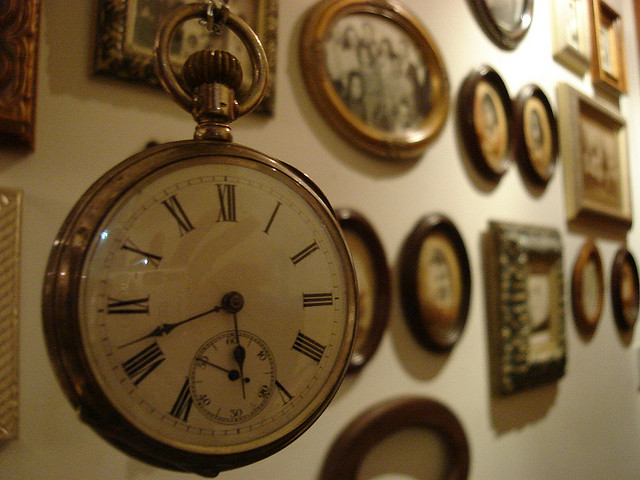English vocabulary for time, history, and eras. Posted by Gabriele on Jul 28, 2014 in English Vocabulary
We divide time up in many ways, for example:
seconds
minutes (60 seconds = 1 minute)
hours (60 minutes = 1 hour)
days
months (28-31 days = 1 month)
years (12 months = 1 year)
decades (1 decade = 10 years)
centuries (1 century = 100 years)
This type of vocabulary for talking about time is rather common, but there are other ways to divide up time, and additional words to talk about time in English, which we are going to look at today. First let’s see two common terms for dividing up most of human history.
Anno Domini (AD)
Before Christ/Before Common Era (BC)
These are terms used to label or number years in the Gregorian calendar, which is the calendar used in America and most of Europe. The term Anno Domini is Latin and translates in English to ‘In the year of the Lord.’ These terms are used to talk about eras (era = a long period of time) in human history. These two terms are based on the year of the birth of Jesus Christ (who is considered the incarnation of the “the Lord” in Christianity).
AD is used for counting years from the start of this current era in which we live. BC is used for counting years before the start of the current era. The years in the BC era are counted backwards from the way in which the years are counted in the AD era. There is no year zero in this system, so the year AD 1 immediately follows the year 1 BC. Using this system we are now in the year 2014 AD.
Other ways of dividing time include naming eras or periods of time in history. Here are some commonly talked about periods of time and eras in the Western world that would be good to be familiar with.
The Middle Ages: This period of time took place in Europe from the 5th–15th century; this is the name for a long period of time that connects what is considered ‘ancient times’ and ‘modern times.’ It is in the middle of ancient times and modern times, so it is called the “middle” ages.
The Renaissance: This period of time took place in parts of Europe from 1300 – 1600; this time was characterized by a cultural movement that revolved around learning about and from the past.
The Age of Discovery (The Age of Exploration): This period of time took place in Europe (and highly influenced other parts of the world) from 1400 – 1700; this was a time of exploration when Europeans travelled to new lands and “discovered” the Americas.
The Elizabethan Period: This period of time took place in the United Kingdom from 1558 – 1603; this was the period of the reign of Queen Elizabeth I. This time is often thought of as the “golden age” or time of great progress in English history.
The Age of Enlightenment: This period of time took place in Europe in the 18th century; it is an often talked about cultural movement in Europe, which emphasized reason and individualism over traditions.
The Industrial Revolution: This period of time took place in Europe, the United States, and other areas around the world in the 18th and 19th centuries; this was the era in which manufacturing was introduced and became a very large force in society.
The Victorian Era: This period of time took place in the United Kingdom from 1837–1901; this was the period of the reign of Queen Victoria and was known for being a time of peace, prosperity, and British self-confidence and pride.
The Progressive Era: This period of time took place in the United States from the 1890s–1920s; this was a period of social activism and political reform during the terms of three progressive American Presidents: Theodore Roosevelt, William Howard Taft, Woodrow Wilson.
The Information Age (or Computer Age or Digital Age): This is now! This is the name many people use for the era that we are currently living in, in which technology has become so important and prevalent in our everyday lives and work.
This is just a brief review of common terms used to describe periods of time in the Americas and Europe. There are, of course, many other ways of dividing up time, especially when talking about history.
It would be great if all those reading this post could add to this list by writing about an era from your own culture. Please leave a comment below and we can continue to grow our vocabulary about time.

Build vocabulary, practice pronunciation, and more with Transparent Language Online. Available anytime, anywhere, on any device.
About the Author: Gabriele
Hi there! I am one of Transparent Language's ESL bloggers. I am a 32-year-old native English speaker who was born and raised in the United States. I am living in Washington, DC now, but I have lived all over the US and also spent many years living and working abroad. I started teaching English as a second language in 2005 after completing a Master's in Applied Linguists and a Certificate in English Language Teaching to Adults' (CELTA). Since that time I have taught ESL in the United States at the community college and university level. I have also gone on to pursue my doctorate in psychology and now I also teach courses in psychology. I like to stay connected to ESL learners around the world through Transparent Languages ESL Blog. Please ask questions and leave comments on the blog and I will be sure to answer them.




